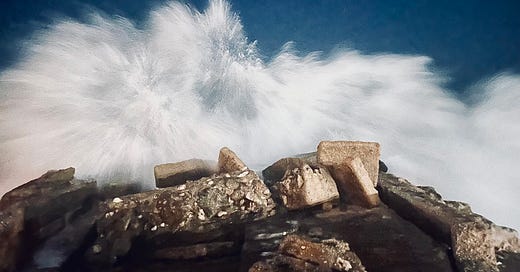I am grappling with the juxtaposition of grief and genocide. Grief is one of the most natural facets of the human experience, but there is nothing natural about genocide. Genocide is a man-made devastation, a brutal manifestation of hatred and greed. Grief is a guaranteed feature of what it means to be human. There is no way to get through life without loss. But what is to be said about loss of this magnitude? Loss of an entire place, a container of a people’s humanity, lineage, and memories. Loss that is entirely preventable, entirely fueled by the darkest shadows of the human mind.
I am taking a break from talk therapy and have shifted to working with a somatic healer. I am exhausted from trying to make sense of genocide on a cognitive level. There is no sense to be found. Instead, I am exploring how trauma and grief show up in my body. When I feel tightness in my solar plexus, what does it mean? When I feel sharp pains in my heart center, what am I remembering? When my jaw clenches, what tension am I holding onto? I am learning the language of bodily pain, learning to listen to what it has to say to me.
Last week, the healer guided me to put my hand on my chest and breathe. She asked me to put language to whatever thoughts arose. The rise and fall of my chest reminded me of the Mediterranean Sea, memories flooded back to me of a weekend I spent alone in the coastal city of Haifa. I spoke of feeling held by the sea, the sun kissing my body while the gentle waves held me.
I had to abruptly cut that weekend short to return to the West Bank for a funeral. I took public transportation back to Ramallah, transferring five times between buses and trains. Along the way, I remembered all the small interactions, sometimes with nature, sometimes with Palestinians, that guided and held me along the journey. To conclude our first session, the healer asked me to spend the next week reflecting on the difference of being soothed versus being tended to, and how I experienced those sensations in Palestine.
Like I said, I am deeply exhausted. I have taken some time away from writing to recalibrate how I wish to wield this craft in service of Palestine. I’ve decided I am done, for now, with trying to educate people on the truth of this catastrophe, done with hoping for an awakening to moral clarity that moves the masses to meaningful action.
Moving forward, I will write to honor my time in Palestine, honor the people and place that held, soothed, and tended to my existence. I want to pull the threads of memory, unravel the little moments that held enormous significance and are stored in the recesses of my heart and soul. I want to return to the process of developing my book, a work I hope to offer as a contribution to the struggle for Palestinian liberation.
I will be writing these reflections to an intimate audience of paid subscribers. Palestinian pain is sacred. The pain of those of us who are personally connected to Palestine is sacred. I used to think that offering my grief publicly was a means to give people insight into the severity of the loss of Gaza. Now, I value my grief as something sacred, private, and intimate. By writing to a smaller audience of people who are invested in my journey as a writer, I place energetic boundaries around my grief and engage in reciprocity for my vulnerability. If you’d like to be part of this exploration, you can become a paid subscriber. I intend to uncover some of my deepest writing through this concerted exploration of pain and healing.
I will use my discernment around when to post publicly. Tangible ways to support Gaza or testimonies that come to me from Gaza will always remain public. But my story, my healing, and my reflections will require a layer of intentional access.
When I am not in the throes of sorrow over Gaza, I am in awe. In awe of my friends there who are continuing to show up in service of their people, all the while enduring genocide themselves. Ryan Sturgill, my former director at Gaza Sky Geeks, has been working with the 188 Foundation to deploy funds to Gaza that are being used to distribute food, water, and tents. If you would like to contribute to that effort, please read his note here that includes a PayPal link where you can donate.
Solidarity is not a feeling. Solidarity is a verb. As we enter the eleventh month of the genocide of the Palestinian people of Gaza, I encourage you to take a moment to put your hand to your chest. Breathe deeply and close your eyes. Listen to what your heart has to say to you, what it’s asking you to do.




Thank you for sharing this beautiful piece, Anam.
I love this for you. What’s right for you. What you need to distill. Instead of showing someone else the way via all the factual horrors.
I get that intention, but walking the path embodied will illuminate further than you initially imagined. Feeling so proud of your choice and to opt into the sacred. 🇵🇸 🫀